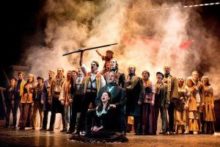By Jack Collins
Is Romance dead?
The Bachelor, an ABC reality television show, is a product of the modern age. Essentially, a man is provided several women whom he must simultaneously date until, in the season’s finale, he chooses the woman he deems the “best” one. This meaningless contest containing so little romance persists year after year, manufacturing 30 more hours of “love” and various histrionics each time.
And it does not deviate from the modern standard—it is highly typical of entertainment media. The majority of digital media and print media—not to mention musical media—contain shallow, commercialized romance. Scattered so sparsely within their pages and scenes lie only glimpses of rare romantic sensibilities that are difficult to find in the 21st century.
What is romance though? It isn’t just a lovey feeling that two people have. Romance more accurately refers to the predominantly 19th-century artistic movement. In that period, Romanticism celebrated aestheticism, an appreciation of the beauty of ideas such as love and nobility. It is a distinct departure from the romance of today, which celebrates empty love that makes the most profit.
Though adopted as a movement only 200 years ago, Romance has existed much longer. Since those days in Prehistory when the first people felt a desire for stories, the need for romance has been innate to humanity. This burning desire has not diminished in the millennia following, and every day, the average person searches for that fulfillment.
Today, though, hyper-commercialization of such fulfillment means that the quantity of media producing romance has skyrocketed while the actual Romance in each has dropped precipitously, close to zero. The market is over-saturated, and the result is a considerably lower standard for the average modern romance that is not all that Romantic. Because the Romance in each piece is so low and need the same, most must consume massive quantities to attain satisfaction. Inevitably, everybody finds themselves in the race for satisfaction against modern consumerism.
Yet there are pieces that do not follow this deleterious pattern. They go against the grain because their Romance is so strong and permeates them completely, in direct contrast to the emptiness of modern convention. Among them is Les Misérables, likely the most Romantic of them all.
Les Misérables has it all: love, loss, war, natural beauty, sacrifice, and that subtle yearning for the Infinite so often forgotten in the 21st century. One needs only point to the angelically innocent and perfectly beautiful love story shared by Marius and Cosette; to admire Enjolras’ absolutely selfless idealism and Jean Valjean’s noble sacrifice; to stroll through the garden of Hugo’s delightful prose and smell the flowers; to immerse oneself fully in the peak of literary Romanticism.
For those reading or even watching it, Les Misérables is more than just a small morsel of Romance. It amounts to an enormous and complete satisfaction that rebels against modern practice—a satisfaction evoked by books and movies upholding that same standard for Romance.
How about J.R.R. Tolkien’s Lord of The Rings? Tolkien was fundamentally a Romantic—his fantasy series follows the selfless quest of a young man (hobbit, really) and contains unbreakable friendships, forbidden love, incredible sacrifice, and the nobility born of a higher cause. All of these create a Romantic appeal to rival any, and have led the series to become one of the highest-selling series of all time (its prequel, The Hobbit is one of the highest-selling single novels); similarly, Peter Jackson’s recent film adaptations are some of the highest-grossing films in history.
While other commercialized romances may have reached comparable levels, the fact that the story of Lord of The Rings has retained its relevance and high popularity since its publication in 1954 is stunning. In the same way, Les Miserables continues to be a mainstay of readers—and more recently theater enthusiasts—as it has been for more than 150 years. The longevity of their popularity and relevance, as much as any literary analysis, speaks to power of of the Romance contained within.
Where in The Bachelor or countless other comparable farces is the aestheticism of nobility or uncontrived love, of nature or sacrifice? With such small concentrations of those elements, modern romance remains nothing more than pieces which are superficially compelling, but ultimately unfulfilling.
As long as humanity exists, there will continue to be a need for Romance. Romance is not dead, nor will it ever completely be so. Yet it can all too easily be lost in the frenzied whirlwind of overproduction that perpetually torments society. Though one may be optimistic to look for a reclamation of Romantic integrity in the future, the present calls for us to go to novels like Les Misérables for satisfaction and resurrect, into popular consideration, the works of Romance that have retained their relevance for so long.

